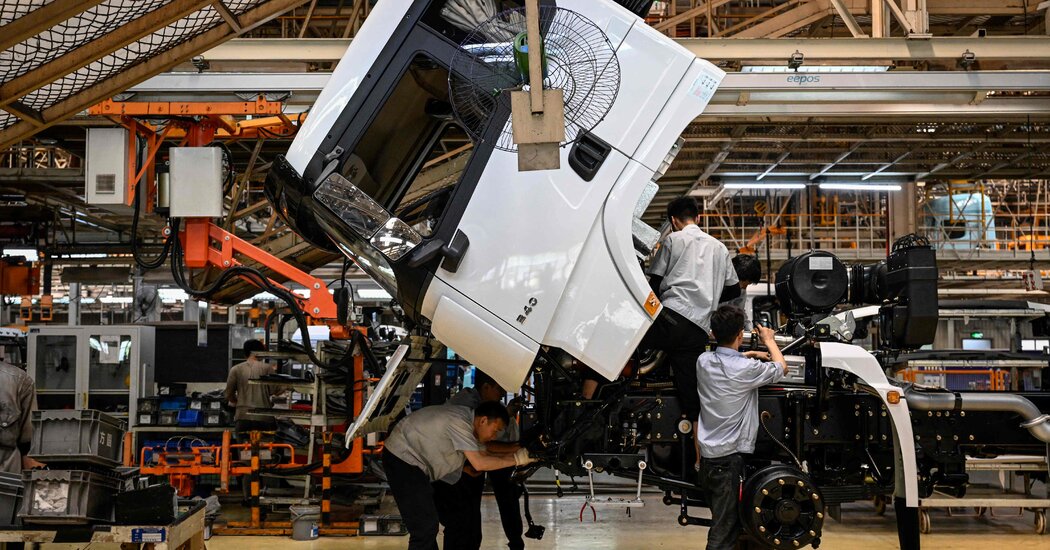The bet should have been a no-brainer. China reopened after nearly three years of pandemic lockdowns, and investors expected its economy, the world’s second largest, to bounce back. Chinese stocks rose.
But that bet has soured. This week, Chinese stocks traded in Hong Kong briefly slipped into a bear market, having lost more than 20 percent of their value from a January high. Stocks are also in the red this year on the mainland.
The declines reflect bubbling optimism about the viability of China’s post-Covid recovery, which has long been a driver of global growth. Despite ongoing geopolitical tensions between China and the United States, economic and business ties between the two countries remain closely linked.
“All signals out of China point to a bumpy, faltering economic upswing,” said Tina Teng, an analyst at CMC Markets in Auckland, New Zealand.
Beijing is struggling with disappointing consumer spending, slowing home sales and a manufacturing sector in flux. A weaker currency exacerbates the problems. It remains uncertain what action, if any, the Chinese government will take to support growth.
Last year, numerous Covid lockdowns took a heavy toll on the Chinese economy. It grew at 3 percent, a pace that was one of the slowest in decades, well below Beijing’s own target and slower than that of 2021.
Last fall, the authorities shook up the stock market with stimulus measures to support the real estate sector. Another bump followed in December, with the abrupt end of the strict “zero Covid” policy. Equities entered the new year on an upward trend, peaking towards the end of January.
In the first three months of the year, China’s economy grew by 4.5 percent — with consumers accounting for most of its gains — and looked set to recover. Spending has been strong in recent months, particularly in the luxury and food and beverage sectors, but has increasingly fallen short of investor expectations. High youth unemployment further clouds the outlook.
While countries in the West struggle with inflation, China flirts with the opposite and potentially more malicious force of deflation, or persistently low prices that affect the economy by dampening corporate profits and wages.
“Domestic demand is still weak,” Ms Teng said.
As a result, many economists have revised their expectations in recent weeks, contributing to the fall in equity markets. But some analysts, including those from investment banks Nomura and Barclays, still expect China’s gross domestic product to grow faster this year than the government’s forecast of 5 percent growth.
Projections for the US economy, the world’s largest, are lower, but US equities are far outperforming China’s. The S&P 500, a broad index of stocks, is up about 12 percent this year.
Recent decisions by the Communist Party of China and its top leader, Xi Jinping, have hurt stock market sentiment. A crackdown on consultancies and consultancies with foreign ties has spooked some foreign companies and investors, reigniting questions about the viability of international companies doing business in China.
“The recovery has stalled, in part due to Beijing’s inability to boost consumer and business investor confidence,” Nomura economists wrote in a report last month. “As disappointment sets in, we see an increasing risk of a downward spiral, resulting in weaker activity data, rising unemployment, continued disinflation, falling market interest rates and a weaker currency.”
But some observers argue investors simply misjudged China’s reopening of the economy — an event that has no historical parallel. And they missed a shift in how authorities prioritize national security issues over economic ones.
“The mindset of how the Chinese economy is managed is completely different,” said Chris Leung, chief economist for China at DBS Bank. The authorities, he added, will not react as quickly as in the past to a stock market slump by taking aggressive measures to boost stock prices. Policymakers in Beijing are more focused on economic indicators such as production. And through those measures, Mr. Leung, China’s economy “hasn’t gotten too out of step”.
On Thursday, a private sector survey found that factory activity in China had picked up in May, contrary to official data released a day earlier that showed production had continued to contract. The mixed signals have wider implications, as production in China is closely tied to exports, which in turn is an indicator of global demand. A sustained increase in manufacturing would help boost employment, consumer spending and ultimately the stock market in China.
For now, investors will continue to sell Chinese stocks. The biggest losers this year include online retailer JD.com and hot pot chain Haidilao, both with more than 20 percent losses this year. That helped push Hong Kong’s Hang Seng China Enterprises Index to its lowest closing level of the year on Thursday. After rallying on Friday, the index is about 17 percent lower than its January high. The CSI 300 Index, which tracks the largest listed companies in Shanghai and Shenzhen, is down about 8 percent since peaking in January.
The real estate sector continues to be a source of fear for investors. Real estate sales of the top 100 companies fell about 14 percent in May from the previous month, according to data released this week by China Real Estate Information Corporation.
China’s housing woes – developers deeply indebted and borrowers left with half-finished apartments – have led to expectations that China’s central bank will feel compelled to cut interest rates this year.
Both Nomura and Barclays forecast that China will show significantly higher economic growth in the three months ending June – close to 8 percent. According to both projections, growth for the next two quarters of the year will then moderate to the level of earlier this year.
Analysts expect stock market performance to improve over time. “Exaggerated pessimism usually corrects itself,” said Mr. Leung.

